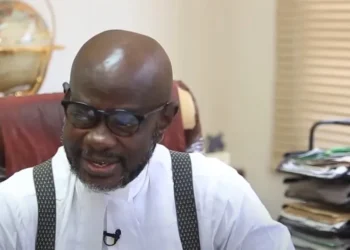financial analyst Dr. Wisdom Kofi Dogbey has raised concerns about the effectiveness of the Bank of Ghana’s monetary policy, particularly about the central bank’s policy rate and its role in managing inflation.
According to Dr. Dogbey, despite a significant reduction in inflation over the past year, the policy rate remains relatively high, raising questions about its effectiveness in addressing the country’s economic challenges. Dr. Dogbey noted that inflation in Ghana has seen a marked improvement. However, the significant drop in inflation is commendable, yet the Bank of Ghana’s Monetary Policy Committee (MPC) has only made a marginal reduction in the policy rate, from 29.5% to 28.5%, over the same period.
“Inflation has cooled from the mid-fifties in 2022 to the current rate of about 22 percent. Yet the policy rate has only declined by a percentage point over the same period.”
Dr. Wisdom Kofi Dogbey Financial Analyst
Dr. Dogbey believes that this disconnects between inflation and the policy rate raises questions about the effectiveness of the rate in managing inflation and supporting the broader economy. Dr. Dogbey’s concerns align with a growing sentiment from the Institute of Economic Affairs (IEA). The IEA has argued that the Bank of Ghana’s approach has not yielded the expected results and that the high policy rate could be stifling economic growth, particularly in the business sector.
The Role of the Policy Rate in Managing Inflation
According to Dr. Dogbe, in theory, central banks use the policy rate to control inflation by influencing borrowing costs, which in turn affects consumer spending and business investment. However, Dr. Dogbey suggested that the Bank of Ghana’s approach might not be as effective as intended.
“The way the policy rate is set, is it taken into account to target inflation or to manage inflation?”
Dr. Wisdom Kofi Dogbey Financial Analyst
Dr. Dogbe’s query reflects a broader concern that while the policy rate may be serving other functions, such as stabilizing the financial sector, it is not effectively curbing inflation or fostering economic growth.
Potential Benefits of a Policy Rate Cut in Ghana
Dr. Dogbey believes that a similar approach in Ghana—cutting the policy rate as inflation declines—would be beneficial for the economy. He argued that lower interest rates could create a more favorable environment for businesses, allowing them to access cheaper credit for investment and expansion. This, in turn, could lead to increased job creation, higher levels of economic activity, and ultimately, stronger economic growth.
“The U.S. is about to cut rates because inflation has cooled significantly and that is good for businesses to begin to invest in expansion, hiring new employees, and also investing more into their businesses because of the favorable rate environment.”
Dr. Wisdom Kofi Dogbey Financial Analyst
Dr. Dogbey noted that the benefits of a rate cut could extend beyond just the business sector, positively impacting households and consumers who would also benefit from lower borrowing costs. Dr. Dogbey argued that cutting the policy rate would send a positive signal to the business community, boosting confidence in the economy and encouraging investment. “I think it will be a good thing for the Monetary Policy Committee to take that decision and cut rates.’’ He emphasized.

Criticism of the Current Policy Rate
Dr. Dogbe argued that maintaining such a high policy rate could hinder economic recovery by making borrowing expensive for businesses and consumers. This could ultimately stifle economic activity and prevent the country from realizing its full growth potential.
“I don’t believe the policy rate has been entirely effective in Ghana in addressing inflation, with the decline that we’ve seen in inflation. Yet still, the policy rate is pretty high.”
Dr. Wisdom Kofi Dogbey Financial Analyst
Dr. Dogbe emphasized that while the policy rate may have helped stabilize inflation in the past, its continued elevation in the face of falling inflation is counterproductive and risks undermining the country’s economic recovery.
Dr. Dogbe seeks to highlight the growing concerns among financial experts and analysts regarding the effectiveness of the Bank of Ghana’s policy rate in managing inflation and promoting economic growth. He has called on the central bank to consider cutting the policy rate, particularly in light of the significant decline in inflation.
While acknowledging the challenges facing the Ghanaian economy, Dr. Dogbey believes that a more accommodative monetary policy, including lower interest rates, would help stimulate investment, create jobs, and foster economic growth. “I think a rate cut would be beneficial to boost economic activity in the nation,” he said, calling for a more dynamic approach to monetary policy. Ultimately, as inflation continues to fall, the Bank of Ghana faces increasing pressure to reassess its monetary policy framework and consider more proactive measures to support the country’s economic recovery.
READ ALSO; Omotola Jalade Reveals Her Name is Trademarked Following Fan’s Comment







